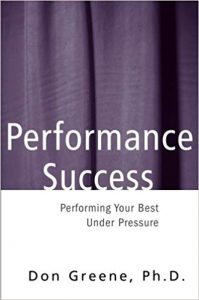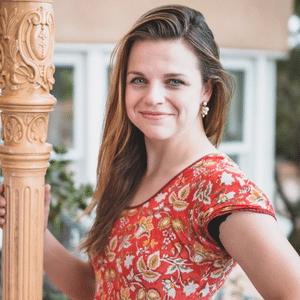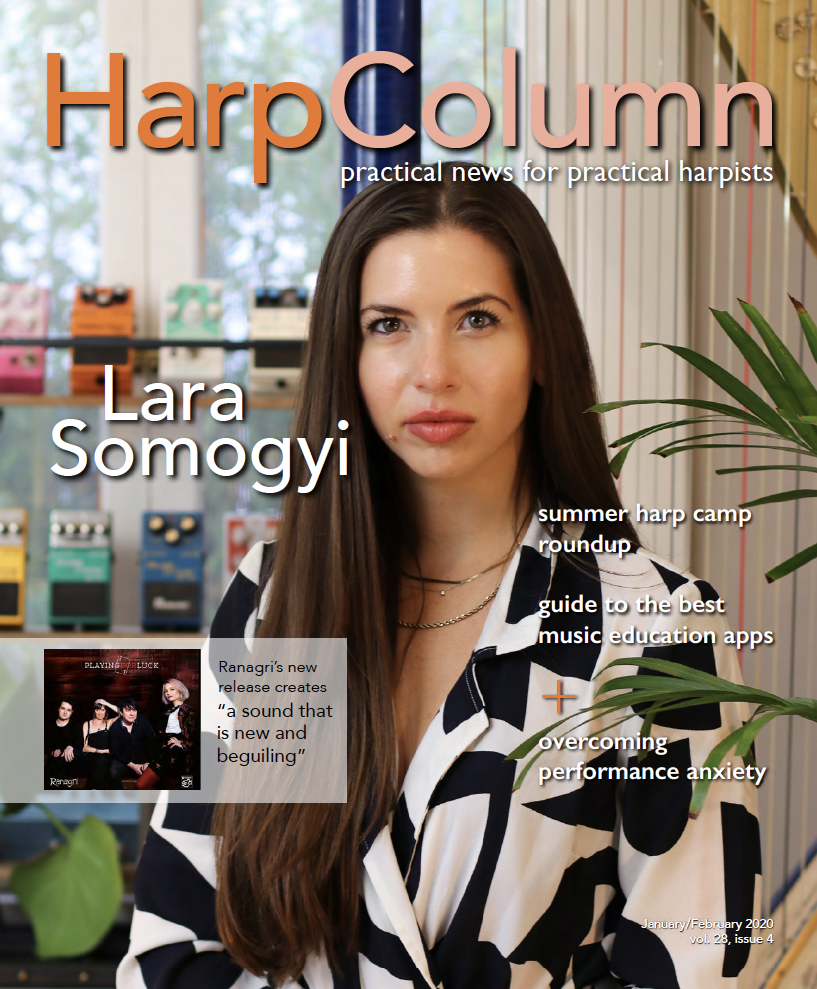We’ve all been there…it’s a few minutes before you walk on stage: your heart is racing, your hands are clammy, and you’re starting to regret eating that Reuben you ate for lunch. You know you practiced for this a million times, but you can’t help imagining doomsday scenarios: What if you mess up the third page? Do you remember all the pedals in the cadenza? Are you sure you’re ready for this?

No matter how prepared you are, the voice of performance anxiety seems to find us at our most vulnerable moments and can block our ability to achieve optimal performance. It wasn’t until I was 24, having tried everything from beta-blockers and bananas to lucky underwear, that I discovered the field of performance psychology and finally, a method to the madness! Over the next two articles, I’ll be sharing all the resources that helped me reign in my Nervous Nellie and learn to play my heart out in every performance.
Understanding nerves and centering
From a physical standpoint, “nerves” are basically an excess of energy caused by a build-up of adrenaline—a natural byproduct of the “fight or flight” reaction to stress from the caveman days. When confronted with a stressful situation, the left brain (your analytical, critical “doomsday” voice) ramps up the dialogue, causing your body to react with increased heart rate, sweating, and lots of tension—not an ideal state for performance. Rather than battling through the madness, you can learn ways to harness your energy using a technique called centering: an ancient Japanese visualization tool that helps you balance your energy and reconnect with the artistic right brain, where mental quiet and peak performance happen. Check out Dr. Don Greene’s Youtube video Performance Anxiety and Centering to learn this essential performance skill.
Mental rehearsal (do as Olympians do)

Raise your hand if you’ve heard of the great American diver, Greg Louganis. After hitting his head on the diving board in the ’88 Olympic prelims, Greg bounced back only 20 minutes later to perform several perfect dives, winning him the gold medal. His secret? “I’d practiced the dive a million times in my head; this was just one more time.” Whether it’s diving, harping, or any challenging event, we can all benefit from visualization to practice execution using our strongest ally: our mind. Here’s how visualization works for me: First, center your energy and visualize the space where you are meant to perform. Flesh out every sight, smell, feeling, and sound around you, beginning with your first note. Imagine yourself performing flawlessly—feeling and seeing every string beneath your fingers and every pedal under your feet—and incorporate lots of positive self-talk and physical relaxation along the way. If you run into a mistake or a doomsday thought along the way, no worries—simply rewind, slow down, correct the mistake, and move on.
Here are some ways to respond to your doomsday voice with positive self-talk:
👎Don’t miss that pedal!
👍Trust your feet!
👎Uh oh, the hard part is coming up!
👍I love a challenge!
👎You stink at counting!γ
👍Your rhythm is improving every day!
Hot tip: Your brain doesn’t hear the word “don’t,” so if you say, “I hope I don’t mess up the cadenza,” you can bank on a self-fulfilling prophecy.
Mind your self-talk
Do you sometimes feel like there are multiple voices in your head? Me too! Turns out, that’s totally normal, not just for us wacky harpists, but for all humans—even Zen masters! The fact is, our brains are constantly processing information and sharing observations in the form of passing thoughts. The challenges then become how to distinguish your own voice from anxious thoughts, and how to reframe them with affirmations and empowering statements. (Note: If the thought begins with “what if,” it’s probably not helping you.)
Remember, building positive self-talk takes patience, hard work, and lots of compassion. So be kind to yourself, practice mindfulness, and remember that you are your own best friend.
Performance practice
After all the hard prep work, you can test the waters with a mock performance: a full run-through in the company of friends or family, recorded so you can listen back objectively. Even if it’s just a simulation, mocks are a great opportunity to get your heart rate up, test your emergency responses, and take your positive self-talk out for a spin. Once you’ve done a basic mock, try upping the pressure: do 30 jumping jacks right before a round, run through a solo cold in the middle of the night, and have your friends clang pots and pans together and throw paper planes at the harp while you play. Creating external distractions (as crazy as they may be) will help simulate the stress you experience in performance, so once it’s show time, the performance will seem like a piece of cake.
Whether you’re a beginner or a pro, a hopeless worrywart or cool as a cucumber, we all deserve the opportunity to feel and sound our best. Next article, we’ll explore ways to develop mindfulness, courage, and a self-care routine to combat anxiety from the inside out. •
Performance psychology 101
Read: Performance Success

Allow me to introduce you to my savior: Dr. Don Greene Ph.D., a former Navy SEAL and Olympic sports psychologist who haphazardly became the father of performance psychology when he met his first musician client at a golf clinic. Using the same basic approach he uses with competitive athletes, Greene’s musician-friendly method has helped thousands of musicians (myself included) and will help you too.
Subscribe: The Bulletproof Musician
This is my favorite blog, written by Noa Kagayama, Ph.D., a Juilliard-trained classical violinist turned performance psychologist. An early protégé of Don Greene, Kagayama shares his brilliant insights with fun anecdotal tidbits via free weekly newsletters and online coaching sessions.
Download: Musician Hypnosis
This nifty visualization app guides your self-talk and helps you get to your “happy place.” It’s the perfect addition to your pre-performance routine.







